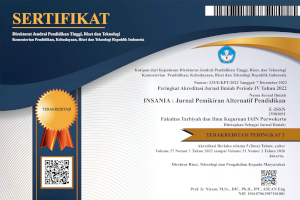TELAAH AGAMA, KONSEP BARU PENDIDIKAN ISLAM DAN SAINS
DOI:
https://doi.org/10.24090/insania.v19i2.712Keywords:
Islam, science, integrationAbstract
This paper is intended to examine the Islamic sciences that have big chance to be integrated with science through the practice of Islamic education. This is done so Islam will be able to re-concern about science vision such it happened in the early days of Islam. There are several models offered of contemporary Muslim scientific epistemology which have big influence among the Islamic world. Some existing offers is the need for shifting the paradigm in the field of Islamic scientific epistemology, namely from Islamic epistemology normative-textual-bayani to the contemporary Islamic scientific epistemology in intuitive-spiritual-Irfani pattern (in axiological) that have many relationship with ethical dimensions to the development of science. Moreover, it needs a redefinition or reconceptualization of the discourse of science in the Islamic world.Downloads
References
Freire, Paulo. 2000. Pendidikan Kaum Tertindas, Pendagogi of The Oppresed. Jakarta: LP3ES.
Mulyasana, Dedi. 2014. “Islam dan Pandangan Baru Pendidikanâ€. Makalah disampaikan pada Seminar Internasional (Integrasi Ilmu-ilmu Islam dan Sains Komparasi antara Universitas Islam Nusantara dengan University Sains Malaysia. Bandung.
Muslim. 2006. “Merajut Ilmu Agama dan Sainsâ€, dalam Jurnal An-Nur edisi Vol. II No. 5. September 2006.
Nasr, Sayyed Hossein. 2005. Antara Tuhan, Manusia dan Alam, Jembatan Filosofis dan Religius Menuju Puncak Spiritual. Alih Bahasa Ali Noer Zaman. Yogyakarta: IRCISOD.
Qur’an dan terjemahnya. Departemen Agama RI.
Sanusi, Achmad. 2014. Pembaharuan Strategi Pendidikan. Bandung: Nuansa Cendikia.
Undang-Undang No. 20 Tahun 2003 Tentang Sistem Pendidikan Nasional.
Downloads
How to Cite
Issue
Section
License
Authors who publish with this journal agree to the following terms:
Authors retain copyright and grant the journal right of first publication with the work simultaneously licensed under a Creative CommonsAttribution-ShareAlike License that allows others to share the work with an acknowledgment of the work's authorship and initial publication in this journal.
Authors are able to enter into separate, additional contractual arrangements for the non-exclusive distribution of the journal's published version of the work (e.g., post it to an institutional repository or publish it in a book), with an acknowledgment of its initial publication in this journal.
Authors are permitted and encouraged to post their work online (e.g., in institutional repositories or on their website) prior to and during the submission process, as it can lead to productive exchanges, as well as earlier and greater citation of published work (See The Effect of Open Access).








